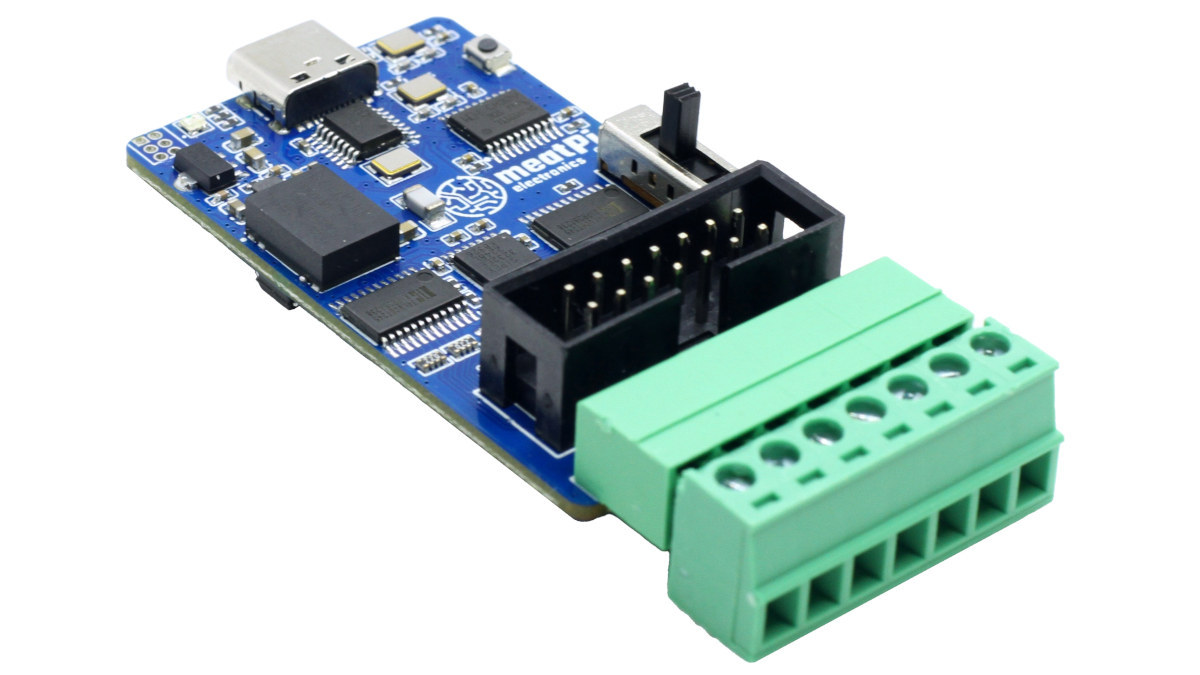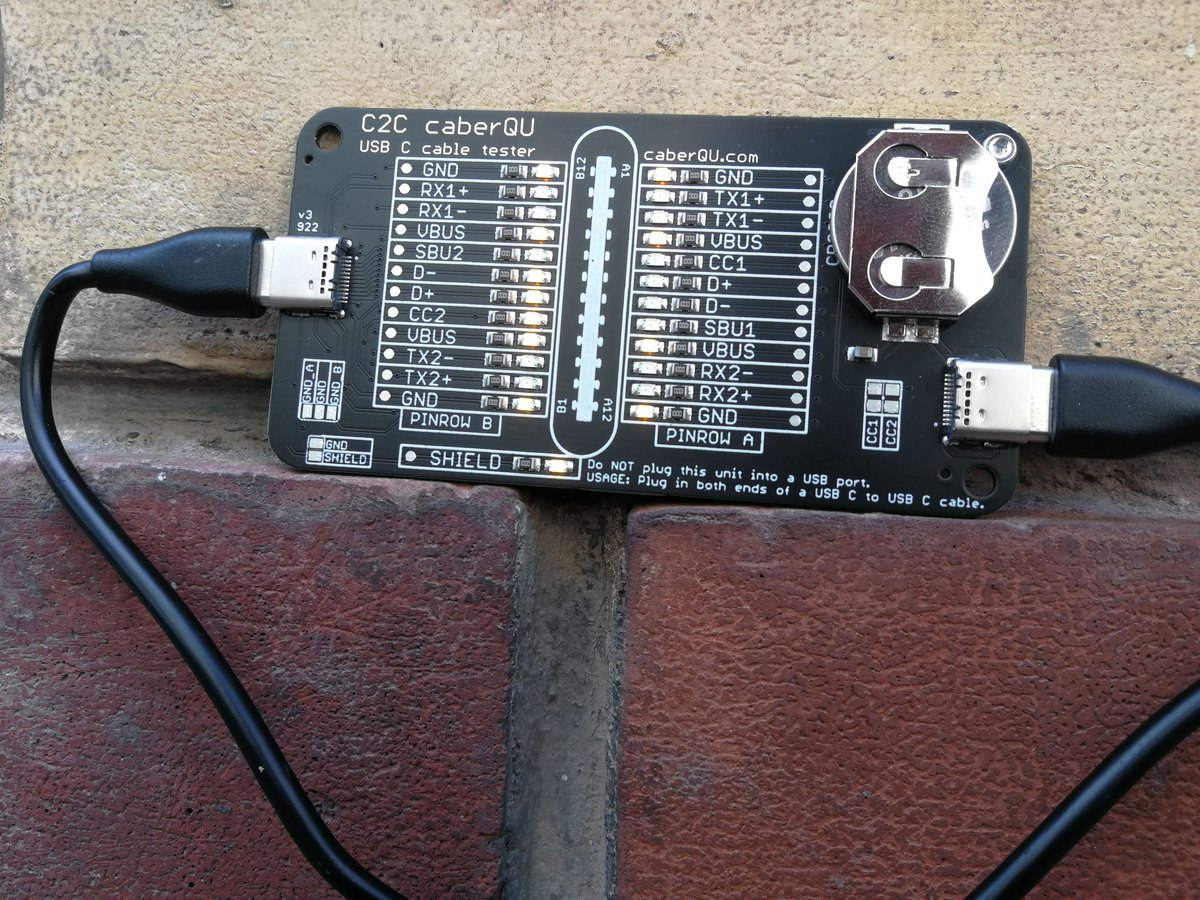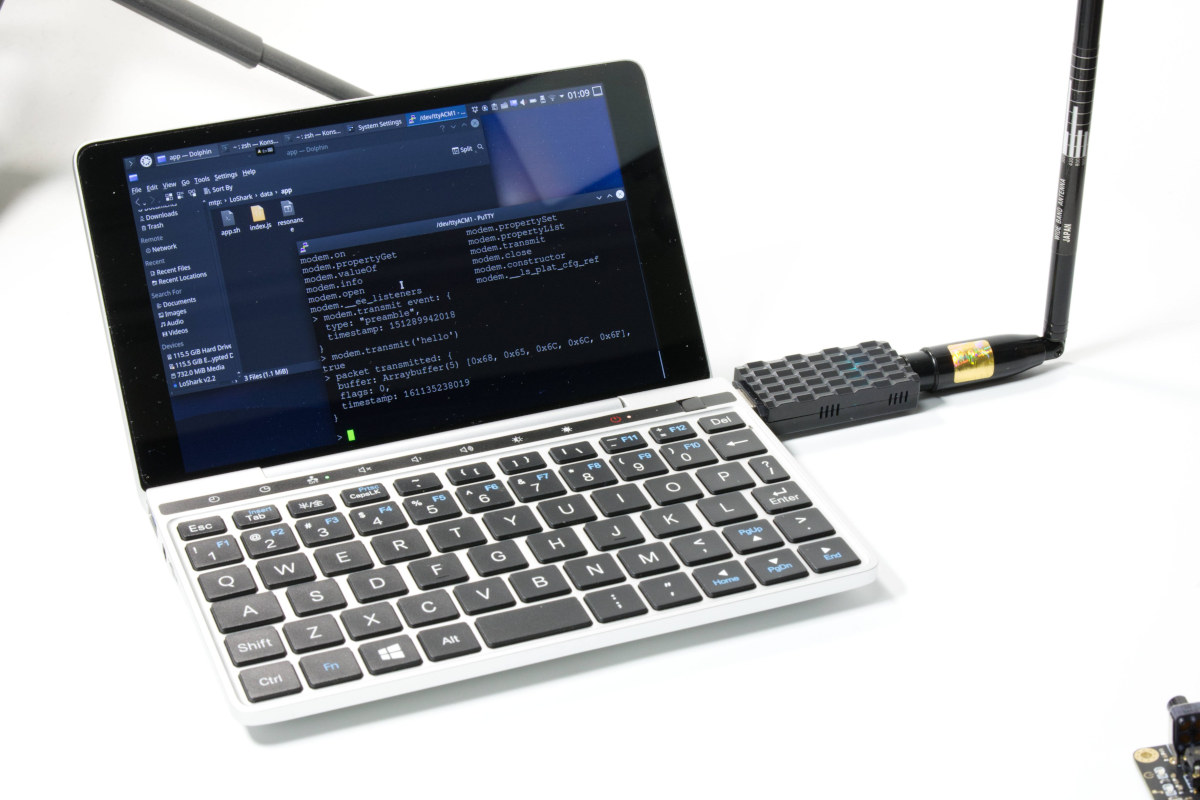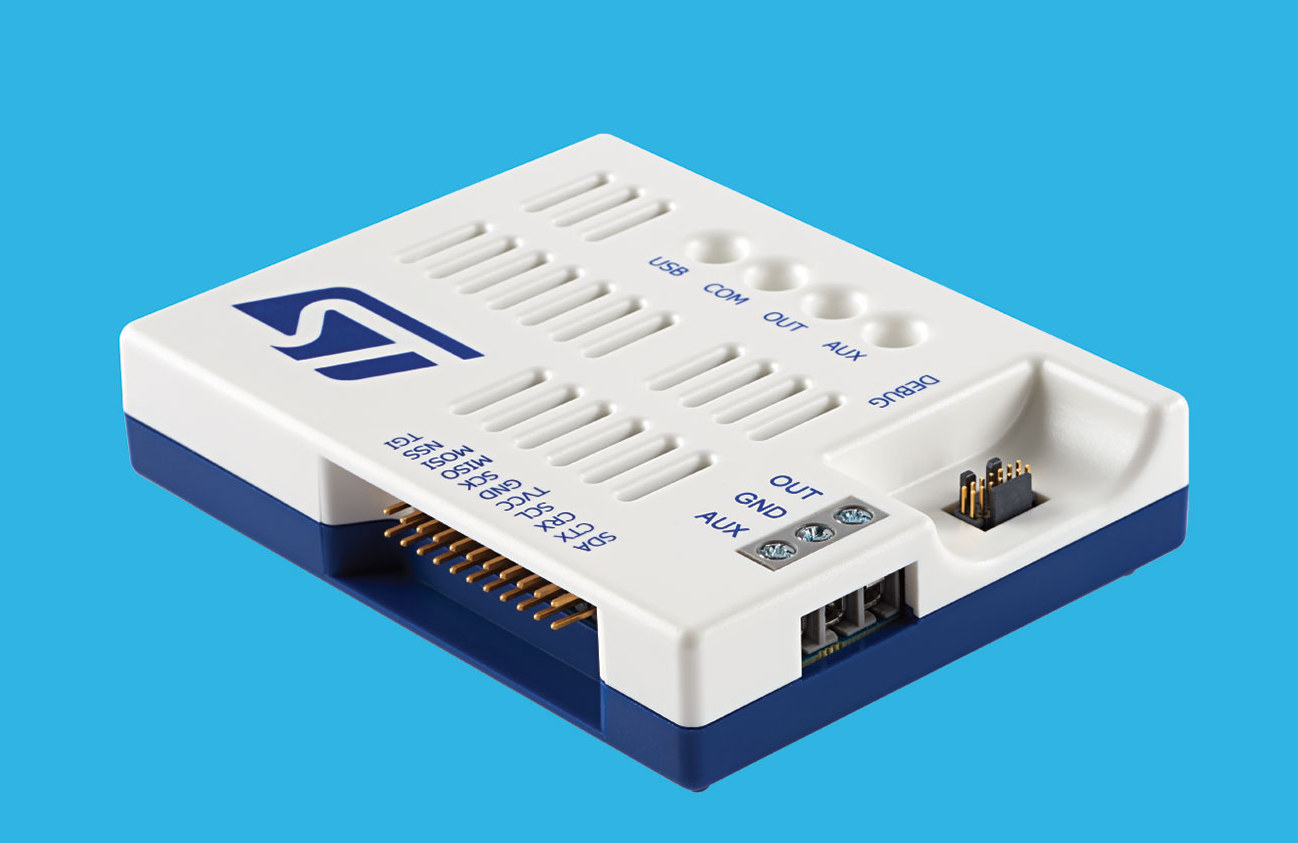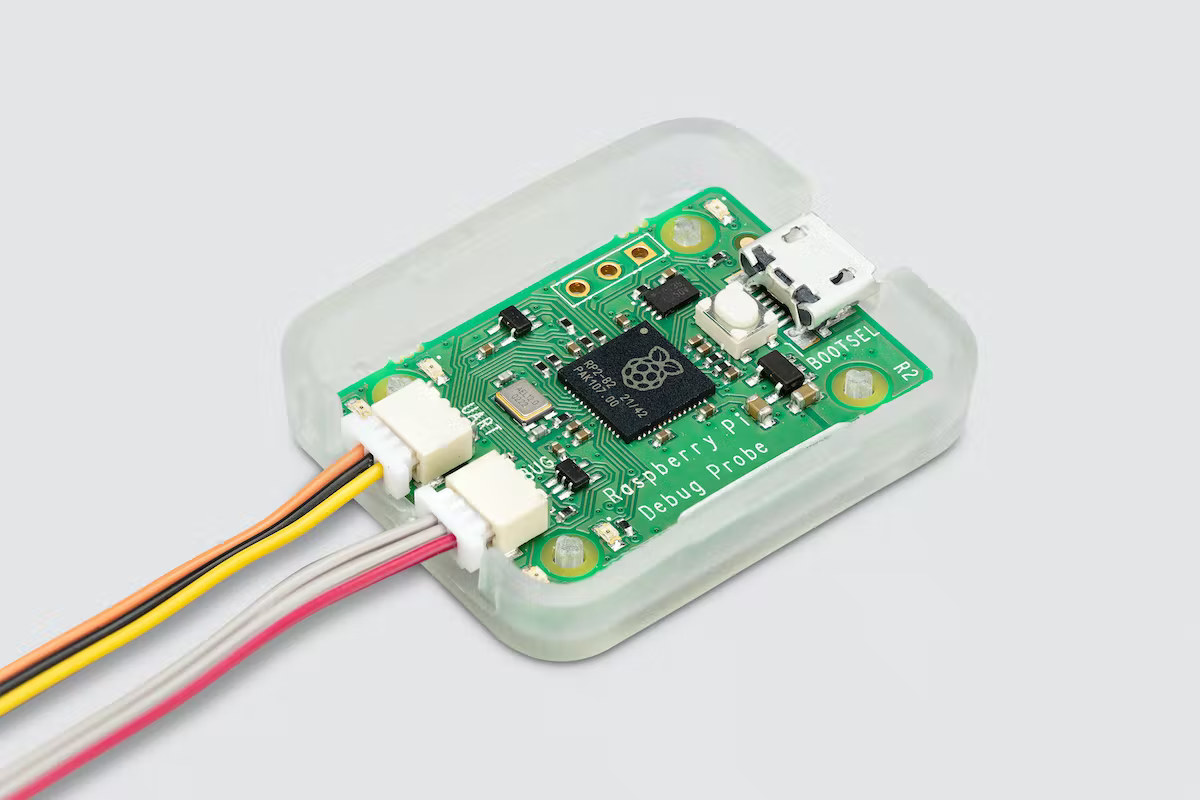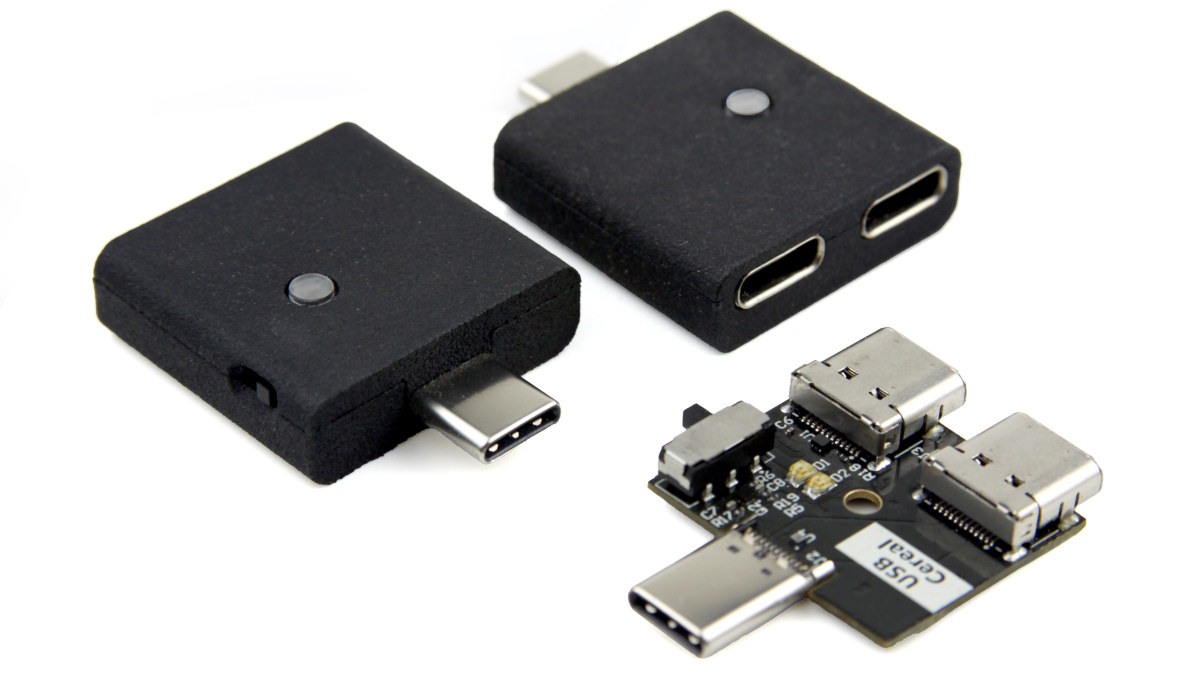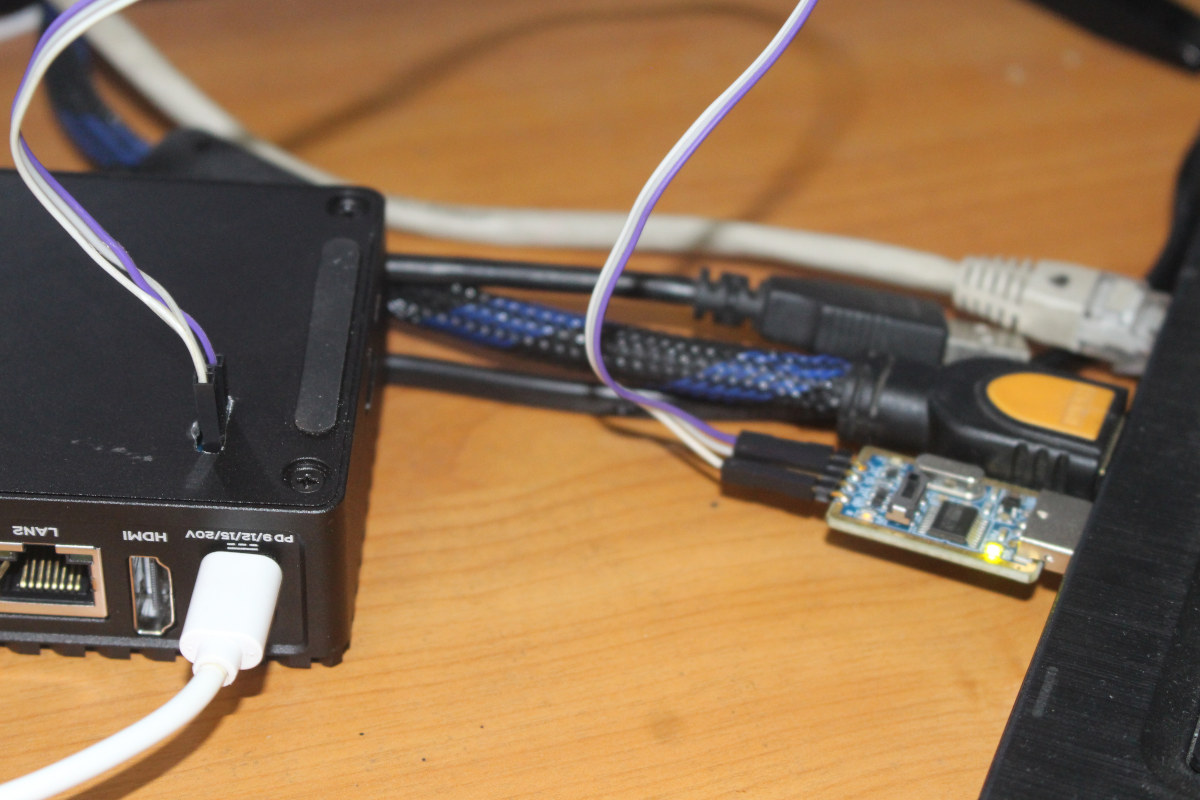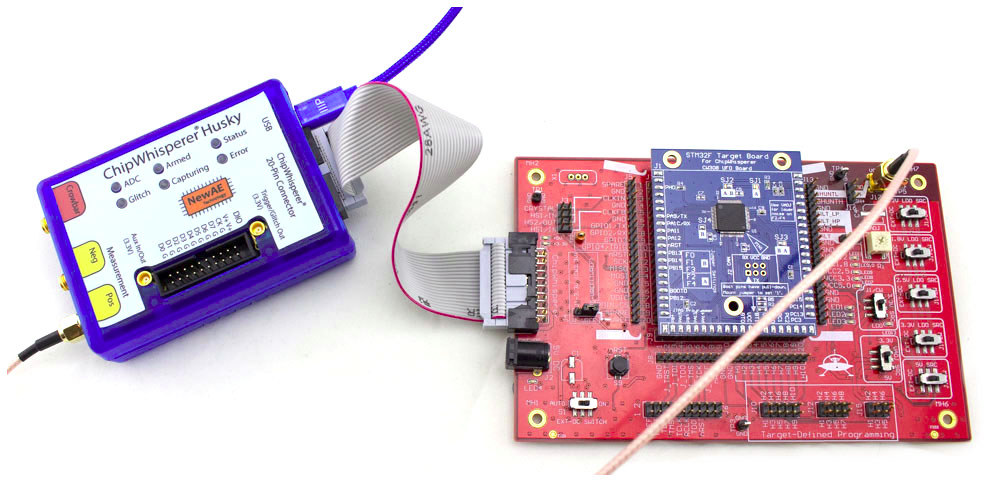Ollie v2 is an improved version of the Ollie USB to isolated UART, CAN Bus, RS232, and RS485 converter that gains a USB-C port, a plastic case, the ability to set the voltage from the target board, and various other minor improvements. Like the first version, the Ollie v2 is a portable tool designed for hackers and field engineers that allows them to work with a single device instead of a bunch of USB converters, each handling a single protocol, and isolation makes sure the host, such as a laptop, is protected from high voltages. Ollie V2 specifications: Serial chip – WCH CH344 quad-serial port chip (instead of XR21V1414 in the first design) Host interface – USB Type-C port Isolated interfaces (all with ESD protection) 2x UART ports up to 6 Mbps with 1.8/3.3/5 V or target voltage levels (set by slide switch) CAN 2.0A/B up to 1 Mbps bus […]
Coin cell-powered boards provide an easy way to test USB-C cables
The A2C caberQU and C2C caberQU boards enable the quick and easy testing of respectively USB-A to USB-C and USB-C to USB-C cables without external hardware. Powered by a CR2032 coin cell battery, the boards apply a voltage to all pins of a cable and measure which ones are connected to the other end. The results can be visualized immediately through various LEDS on the board. The C2C caberQU board comes with a dedicated LED for each of the 24 USB pins and the shield, and it’s possible to test the USB Type-C to USB Type-C cable in several different modes: USB 2.0/1.1 USB Power Delivery USB 3.0/3.1/3.2 Alternate Mode Debug Accessory Mode Audio Adapter Accessory Mode The A2C caberQU board has fewer pins and LEDS for testing USB-A to USB-C cables specifically, but it works the same way. Peter Traunmüller (aka petl) has shot a video showing one of […]
Sudomaker LoShark L1 LoRa USB dongle runs Linux on Ingenic X1501 MIPS processor
Sudomaker LoShark L1 is a USB dongle with Semtech SX1262/SX1268 LoRa transceiver and a Linux-capable Ingenic X1501 MIPS processor with 8MB on-chip memory that serves as a LoRa debug tool that can use a JavaScript interface to access to all SX126x chip registers. The LoShark L1 USB key offers both LoRa connectivity and debugging capabilities such as packet capture (hence the reference to WireShark) and can operate either independently (standalone) or in conjunction with a PC as shown below with a mini laptop. LoShark L1 specifications: SoC – Ingenic X1501 MIPS processor @ 1 GHz with 8MB DRAM, 2200+ CoreMark, Memory – Optional 8MB PSRAM (Lyontek LY68L6400SLIT) Storage – 4GB MLC or 256 MB SLC NAND flash Wireless connectivity HJSIP HJ-68LR LoRa module based on Semtech SX1262/SX1268 with TCXO Support for 433 MHz, 868 MHz, and 915 MHz bands SMA-F antenna connector USB – 1x USB Type-A male […]
STMicro STLINK-V3PWR debugging & programming probe supports power measurement
STMicro STLINK-V3PWR is a new in-circuit debugging and programming probe made for STM32 microcontrollers and that is said to provide accurate power measurement. The probe is especially useful for battery power IoT and wireless applications and is able to measure current values from nanoamps up to ~500mA with up to ±0.5% accuracy. The STLINK-V3PWR can also power the target over a single USB cable up to 2A. STMicro STLINK-V3PWR key features and specifications: 1‑Quadrant source measurement unit: Programmable voltage source from 1.6 to 3.6 V Output current rating 500 mA with over-current protection (OCP) at 550 mA Programmable sampling rate from 1 SPS to 100 kSPS Dynamic measurement 100 nA to 550 mA current 160 nW to 1.65 W power measurements 50 kHz bandwidth 1.6 MHz acquisition / 2% accuracy Compatible with EEMBC ULPMark tests Auxiliary output voltage source from 1.6 to 3.6 V under up to 2 A (no current measurement, OCP at 2.5 A) Debugging of […]
Raspberry Pi Debug Probe eases bare metal development for $12
The Raspberry Pi Debug Probe is a USB serial adapter based on the Raspberry Pi RP2040 microcontroller and designed to debug the Raspberry Pi Pico, third-party RP2040 boards, and pretty much any Arm board through SWD and/or UART interfaces. The main advantage over a typical USB-to-serial adapter is the presence of a Serial Wire Debug (SWD) bridge used for bare metal code development and debugging through tools such as OpenOCD. The Raspberry Pi Debug Probe specifications: MCU – Raspberry Pi RP2040 dual-core Cortex-M0+ microcontroller @ 133 MHz with 264KB SRAM Storage – 2MB SPI flash (W25Q16JVUXIQ) Debug interfaces 3.3V Serial Wire Debug (SWD) 3-pin JST connector conforming to the Raspberry Pi Debug Connector Specification and compatible with the CMSIS-DAP standard 3.3V serial (UART) 3-pin JST connector USB – Micro USB port to connect to the host Misc BOOTSEL button for flashing firmware to the debug board Unpopulated 3-pin header with […]
USB Cereal is an open-source hardware USB-C debugging & development tool (Crowdfunding)
0xDA LLC’s USB Cereal is an open-source hardware development tool with three USB-C ports designed to simplify the testing, development, debugging, and manufacturing of devices with USB Type-C ports. Initially originated at Google, the USB Cereal project has gone through multiple revisions to optimize its quality and lower the BoM cost, and the device can be used for all sorts of USB Type-C debugging using a UART serial communication with the host device through the USB-C sideband use (SBU) pins typically reserved for device-specific applications. USB Cereal specifications: USB Type-C ports 2x USB-C ports for passthrough between the host and device under test (DUT) Note: the DUT port is on the side with a single USB Type-C connector No orientation detection has been implemented to keep the design as simple and inexpensive as possible 1x USB-C port for capture support to 3 Mbps connected through FTDI FT232RNQ USB to TTL […]
Adding an external serial console port to NanoPi R6S
I had no trouble with my first experience with NanoPi R6S while installing and running the FriendlyWrt/OpenWrt 22.03 image, but that was another story when testing Ubuntu or Debian as the mini PC would not boot at all after flashing the images with eFlasher apparently successfully, but suspiciously fast (under 2 seconds). I spent nearly four hours trying the different images and then the Rockchip Windows utility, but all my attempts failed, and FriendlyElec was not overly helpful. So I decided to connect a serial console to see what was going on. The NanoPi R6S comes with a 3-pin header for the serial console, but it’s not populated. So I soldering one, but not at the top of the bottom, and instead at the bottom since it would allow me to still use the metal enclosure to cool the processor. Some readers, or at least one, often complain about the […]
ChipWhisperer-Husky is a palm-sized power analysis and fault injection tool (Crowdfunding)
NewAE Technology’s ChipWhisperer-Husky is a compact tool designed for side-channel power analysis and fault injection with features such as a high-speed logic analyzer used to visualize glitches, real-time data streaming for attacking asymmetric algorithms, and support for JTAG/SWD programming. The security research company explains its device delivers a more stable and reliable experience compared to other off-the-shelf test gear such as oscilloscopes and function generators thanks to features such as synchronous sampling, which means the sample clock of your target device and the sample clock of ChipWhisperer-Husky can be perfectly aligned, or the ability to generate glitches, including clock glitches that can be less than a nanosecond wide. ChipWhisperer-Husky key features and hardware specifications: Synchronous clock for capture board and target board for significantly improved performance over a typical asynchronous oscilloscope setup 12-bit 200MS/s ADC for capturing power traces – It can be clocked at both the same clock […]


